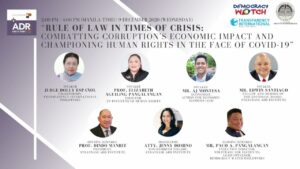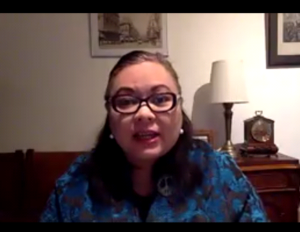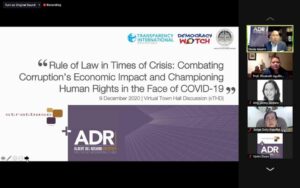Town Hall Meeting on Governance and Human Rights
To commemorate International Anti-Corruption Day on December 9 and International Human Rights Day on 10 December, the UP Institute of Human Rights (UP IHR) co-hosted with Stratbase ADR Institute (ADRi) and Transparency International Philippines a virtual town hall discussion entitled “Rule of Law in Times of Crisis: Combatting Corruption and Championing Human Rights in the Face of COVID-19”. In partnership, the forum aimed at examining how corruption and human rights violations affect the rule of law, Philippine democracy, and economic development.
In the forum held on 9 December, Opening Remarks were given by ADRi President Prof. Victor Andres Manhit, who explained that corruption motivates human rights abuses by providing a financial reward for overriding accountability mechanisms. This, he said, encourages the entry of corrosive capital that exacerbates existing issues in transparency, accountability, and democracy.
There were four speakers, the first of whom was Transparency International Philippines Chairperson Judge Dolly Español. Judge Español underscored the need for congruent anti-corruption policy, robust prosecution of corruption cases, and effective preventive measures. She explained in great detail corruption in government and its negative impact on people.
UP IHR Director, Prof. Elizabeth Aguiling-Pangalangan expounded on the link between governance and human rights. According to Prof. Pangalangan “traditionally, the central consequences of corruption at the highest levels of government were viewed as an issue of the economic and social rights. Government programs on education, public health and public works were being lost to depredation.” She then pointed out that “there has emerged an entirely new dimension, namely, that corruption begets violations of civil and political rights.” She illustrated how corruption has violated human rights principles of equality and non-discrimination such as when public officials are given priority in Covid- testing and treatment, thus discriminating against men and women in the street in accessing public health services. She expanded on how poor governance has led to the curtailment of the freedom of expression and of the press which has negatively affected States’ response to the pandemic.
The third speaker, Mr. AJ Montesa of Action for Economic Reforms, presented on Institutions and Economic Development and related it to COVID-19 measures adopted in the Philippines. Mr. Montesa focused on the political and economic ecosystem and its effect on human rights. On the other hand, Mr. Edwin Santiago of ADRi presented on the adverse human right impacts of corrosive capital. He highlighted how this form of capital preys on existing issues, undermines democratic institutions, and makes countries susceptible to economic and political harm. He concluded that corrosive capital empowers corrupt practices and increases the likelihood and frequency of human rights violations.
In the open forum, participants raised questions mainly on the different issues faced by the government with regard to its response to COVID-19. The virtual town hall discussion is a significant contribution to the global discussion on the issues of corruption, economic damage, and the human rights crisis. The essence of the meaningful discussion is the examination of different solutions on how to collectively address these issues as we face a global health crisis and in light of the upcoming presidential election in the Philippines. Closing Remarks were given by Mr. Paco A. Pangalangan, Executive Director of ADRi who observed that the challenges of corruption, human rights violations, and persistent impunity are only exacerbated by the COVID-19 pandemic and emphasized that mitigating these growing risks demands no less than a whole-of-society response.
The forum was moderated by Atty. Jen Domino, a non-resident fellow of ADRi, who was a Research Assistant at the UP IHR when she was a Juris Doctor student in UP.










































































































 on the upper right corner to select a video.
on the upper right corner to select a video.